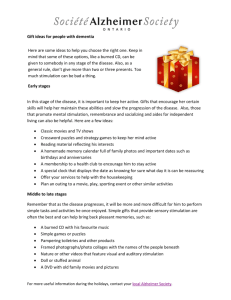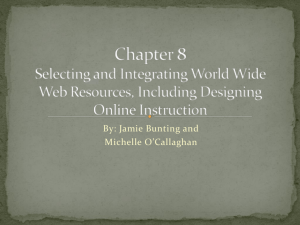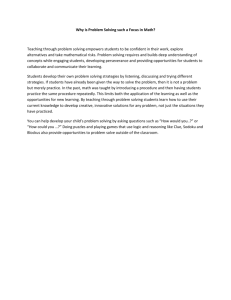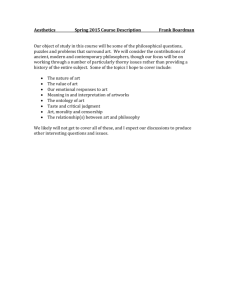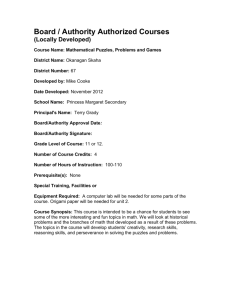Stay at the Top of your Game
advertisement
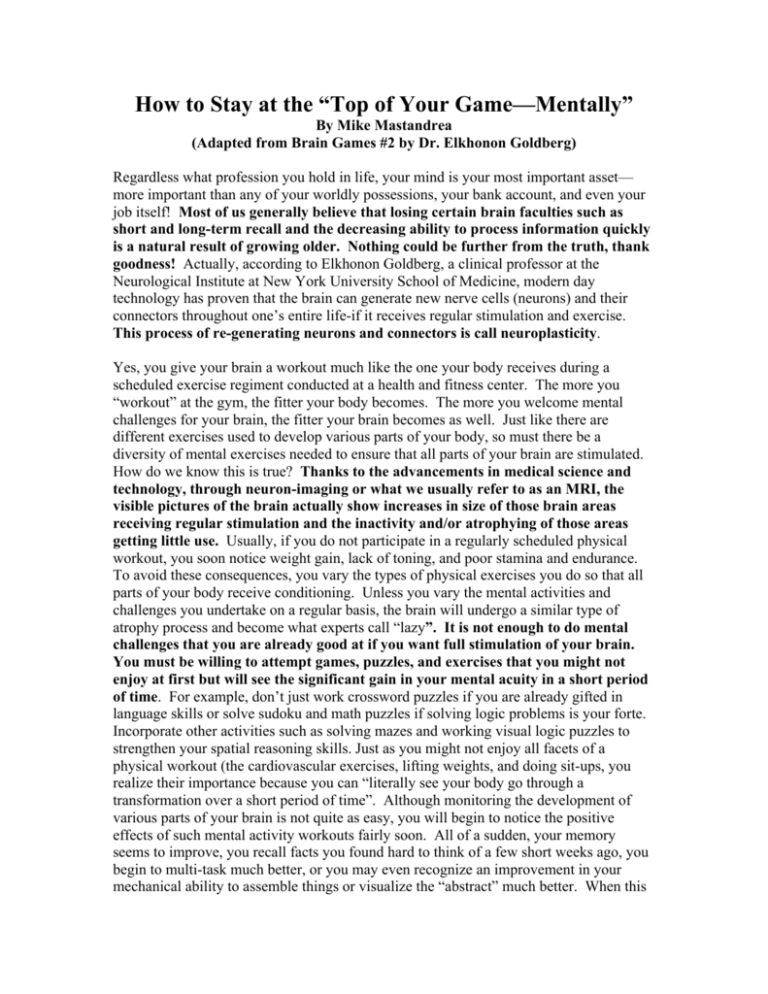
How to Stay at the “Top of Your Game—Mentally” By Mike Mastandrea (Adapted from Brain Games #2 by Dr. Elkhonon Goldberg) Regardless what profession you hold in life, your mind is your most important asset— more important than any of your worldly possessions, your bank account, and even your job itself! Most of us generally believe that losing certain brain faculties such as short and long-term recall and the decreasing ability to process information quickly is a natural result of growing older. Nothing could be further from the truth, thank goodness! Actually, according to Elkhonon Goldberg, a clinical professor at the Neurological Institute at New York University School of Medicine, modern day technology has proven that the brain can generate new nerve cells (neurons) and their connectors throughout one’s entire life-if it receives regular stimulation and exercise. This process of re-generating neurons and connectors is call neuroplasticity. Yes, you give your brain a workout much like the one your body receives during a scheduled exercise regiment conducted at a health and fitness center. The more you “workout” at the gym, the fitter your body becomes. The more you welcome mental challenges for your brain, the fitter your brain becomes as well. Just like there are different exercises used to develop various parts of your body, so must there be a diversity of mental exercises needed to ensure that all parts of your brain are stimulated. How do we know this is true? Thanks to the advancements in medical science and technology, through neuron-imaging or what we usually refer to as an MRI, the visible pictures of the brain actually show increases in size of those brain areas receiving regular stimulation and the inactivity and/or atrophying of those areas getting little use. Usually, if you do not participate in a regularly scheduled physical workout, you soon notice weight gain, lack of toning, and poor stamina and endurance. To avoid these consequences, you vary the types of physical exercises you do so that all parts of your body receive conditioning. Unless you vary the mental activities and challenges you undertake on a regular basis, the brain will undergo a similar type of atrophy process and become what experts call “lazy”. It is not enough to do mental challenges that you are already good at if you want full stimulation of your brain. You must be willing to attempt games, puzzles, and exercises that you might not enjoy at first but will see the significant gain in your mental acuity in a short period of time. For example, don’t just work crossword puzzles if you are already gifted in language skills or solve sudoku and math puzzles if solving logic problems is your forte. Incorporate other activities such as solving mazes and working visual logic puzzles to strengthen your spatial reasoning skills. Just as you might not enjoy all facets of a physical workout (the cardiovascular exercises, lifting weights, and doing sit-ups, you realize their importance because you can “literally see your body go through a transformation over a short period of time”. Although monitoring the development of various parts of your brain is not quite as easy, you will begin to notice the positive effects of such mental activity workouts fairly soon. All of a sudden, your memory seems to improve, you recall facts you found hard to think of a few short weeks ago, you begin to multi-task much better, or you may even recognize an improvement in your mechanical ability to assemble things or visualize the “abstract” much better. When this happens, you will experience that same feeling of exhilaration you received when you stepped on the scales and had lost weight from dieting or became physically toned through conditioning. The best way to accomplish “mental fitness” is through engaging in a wide variety of mental challenges through games. The whole idea is to gain cognitive ability while having fun! Just like you might consult a trainer to evaluate your current physical fitness before developing a regiment of workout activities designed to best suit you, so much you spend a little time evaluating your current mental strengthens a weakness by attempting to solve puzzles designed to stimulate different parts of your brain at the appropriate level of difficulty. You might begin with Level 1 or 2 problems and work up to Level 5 challenges. The most important thing is to WELCOME THE CHALLENGES OF ALL TYPES OF PUZZLES EVEN IF THEY APPEAR TOO HARD FOR YOU TO SOLVE. It is not all about solving them correctly as much as stimulating and conditioning the parts of your brain needed to even tackle them at all. Naturally, the last thing you want to do is discourage yourself or your students by presenting problems that are simply “out of their league” at the current time. You wouldn’t give a beginning/intermediate musician the Opening theme from Tschaikowsky’s “Piano Concerto No. 1” to play or the same level dancer the lead in the “Nutcracker Suite” so why would you give a Level 5 Spatial Reasoning problem to yourself or a student when that area of the brain is the one least developed? The goal is to work up to that level; don’t discourage yourself by trying to solve puzzles that are simply too hard. Rather, start at an appropriate level of difficulty and keep things fun. Before you begin, it might be interesting and quite revealing to “Assess Your Brain” by answering the following questionnaire as honestly as you can. These puzzles were taken from a book entitled Brain Games #2 by Elkhonan Goldberg, a clinical professor of neurology at the NYU School of Medicine. He created the Manhattan-based “Cognitive Enhancement Program”—a fitness center for the brain. There are a series of these “brain game books available at most bookstores and on line. I strongly suggest buying at least one of them if not the entire series. Why? Because as an educator, you must always strive to be at the “top of your game-mentally”. When you continue to develop all parts of your brain and regenerate new neurons and connectors, you just might find yourself becoming more creative in your teaching methods, curriculum development, and motivational techniques used to inspire student learning. You owe it to yourself, your family, your profession, and most of all to your students, regardless which subject matter you teach.

